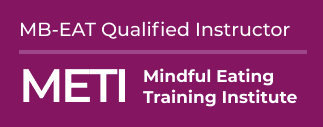About Mindful Eating

What is Mindful Eating?
Mindful Eating is a new way to explore mindfulness in your life and provides an opportunity for you to heal your relationship with food and with yourself. When we practice Mindful Eating we use our mindful awareness – curious, non-judgemental, accepting and kind – to explore our present moment experience with food.
So rather than solely focusing on what we eat, we also investigate the how, where, when and why. This includes our thoughts and emotions about food; body cues such as hunger and fullness; our habitual behaviours and patterns with food; as well as cultivating awareness of the triggers around stress or emotional eating. Self-compassion forms an important part of our Mindful Eating practice – allowing us to take a kinder and more motivating tone with ourselves when it comes to eating and food.
Outer Wisdom
Mindful Eating is all about marrying our inner wisdom with the outer wisdom of food. We are all familiar with dietary advice and guidelines, this forms part of the outer wisdom. However, there is often conflicting or confusing advice when it comes to outer wisdom, and diet culture and fad diets have had quite a profound and damaging impact on our relationship with food and our trust in our bodies.
Food Freedom
Through Mindful Eating we take a new approach to the outer wisdom of food – marrying the components of a whole food diet with “play foods”. Moving away from rules and restriction to a more flexible and gentler approach. Interestingly, as soon as you start to see all foods as neutral (rather than classifying them as “good” and “bad”) you remove the charge from “bad” foods – that is to say they become less interesting – which makes it much less likely for you to binge on “bad” foods. Instead you can focus on whether you actually enjoy the taste of these foods, are they satisfying and when you know you can eat any food any time you want, there is far less likelihood for you to overeat them.
Inner Wisdom
Through our Mindful Eating practice we learn to become more intuitive with our eating and connect once more with our inner wisdom around food. Our inner wisdom involves more awareness of our natural physical cues such as hunger and fullness. Learning to honour and trust these internal messengers once more. As we pay closer attention to our bodies, minds and emotions we can discern the difference between physical and emotional hunger as well as the difference between hunger and cravings. We can also notice negative or unhelpful thinking around food as well as habits and behaviours around food that may not best serve us.
Self-compassion & Mindful Motivation
The old saying goes that “You are your own worst critic”. It is very true that most of us are hard on ourselves, particularly if we get even the slightest hint that we do not ‘match up’ in some way. When it comes to eating, we can be harsh towards ourselves if we overeat, eat in response to stress or emotions, or eat the “wrong foods”.
What self-comapassion allows us to do – in those moments when we are experiencing challenges with food – is to apply this quality of friendliness towards ourselves. Self-compassion also has an active component that can motivate us to make better choices next time, in line with our present moment needs or our long-term health goals.
Heal Your Relationship with Food Today!
Interested in exploring the practice of Mindful Eating for yourself? Find out about our next 7-week MB-EAT based Mindful Eating Course. Our training is delivered by a Qualified MB-EAT instructor, as well as qualified nutrition professionals. This combination of skills allows us to combine both the inner and outer wisdom of food.
Our training also focuses on defining what health means to you; how you can balance long term health goals with food freedom; and how to implement new eating habits that last!



